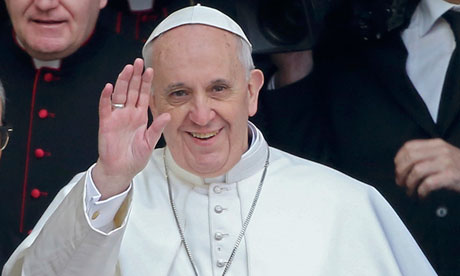Building a reputation as the most LGBT-friendly Pope in history, Pope Francis said in an interview published today that the Church should not interfere spiritually with LGBT people, nor seek to cause them any harm.
According to CNN’s highlights of the interview, published in several languages and 16 countries:
“Religion has the right to express its opinion in the service of the people, but God in creation has set us free: it is not possible to interfere spiritually in the life of a person.”
Francis said that someone once asked him if he “approved” of homosexuality.
“I replied with another question,” he said. “‘Tell me, when God looks at a gay person, does he endorse the existence of this person with love, or reject and condemn this person?’ We must always consider the person. Here we enter into the mystery of the human being.”
Pope Francis also commented on letters he receives from LGBT people who express their frustration and pain trying to reconcile their faith with their identity. Earlier this month it was reported that he had personally called a gay man to express his support, though the Vatican denied the claim, and in July he famously asked, “If someone is gay and he searches for the Lord and has good will, who am I to judge?”
His recent comments echoed that sentiment:
When Francis was a bishop in Buenos Aires, Argentina, he received letters from gays and lesbians who said they were “socially wounded” by the church, he said.
“But the church does not want to do this,” Francis said in the interview.
Of course, we shouldn’t be too quick to sing his praises. The Pope did acknowledge the authority of the Catholic catechism, which still refers to LGBT people as mentally disordered. As a result, his comments could easily be interpreted as a classic retelling of “Love the sinner, hate the sin.”
“By saying this, I said what the catechism says,” the pope told Spadaro. The catechism, the Catholic Church’s book of official doctrine, condemns homosexual acts, but says gays and lesbians “must be accepted with respect, compassion, and sensitivity.”
Pope Francis also made more general statements about the role of the Church in society, women’s place in the Church, and his strict stance on other social issues. He said that “the door is closed” on women’s ordination, but that “the feminine genius” is key to the Church’s and society’s success. As always, same-sex marriage, abortion and contraception are off the table.
Most interestingly, he seems to have acknowledged some of the most substantial criticisms of the Church, admitting once and for all that religion should not serve as a substitute for government, whether in practice or purely in belief:
“The church has sometimes locked itself up in small things,” the pope said, “in small-minded rules.”
“The people of God want pastors,” Francis continued, “not clergy acting like bureaucrats or government officials.”
I would love it if this last statement were an unabashed denouncement of the entanglement between church and state, but I’m sure that kind of analysis is a stretch. Regardless, this is a sign that the times are changing. Officials in the Catholic Church are aware of their waning influence, and they’re trying to do something about it.
This is far from revolutionary — no matter the Pope’s statements, the principles of the catechism will always loom overhead. But for LGBT people who have suffered the Church’s bigotry and mistreatment for years, even the slightest reassurance is a significant step.
